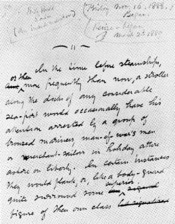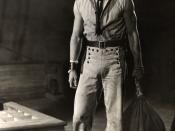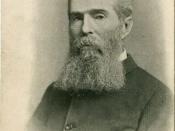Changing Verdicts
The trials in both Billy Budd and Twelve Angry Men have a 'jury' of sorts, and in each story, the members of these juries are virtually unanimous in their decision, but one person remains who would vote against his/her fellow jurors. As it happens, both juries completely change the verdict from what it appeared each jury would have originally voted. I hope to show you the similarities/differences of these two stories by exposing biased verdicts and the fact that one person changed the final verdict in both cases.
The trial of Billy Budd is a quick one, but quite a lot of decision-making takes place. Three of the officers on Billy's ship (the Drumhead Corps) are trying to come to a decision as to what should be done about the murder of Claggart. They know Billy is guilty of the crime, but are willing to acquit him on the base that Claggart had it coming to him.
The only witness to the crime, Captain Vere, reminds the DC that a crime was committed, whether malice was intentional, or unintentional, and that the DC should not bias their verdict simply because Billy is a good person:
What shame to us such a conjecture on their part, and how deadly to discipline. You see then, whither, prompted by duty and the law, I steadfastly drive. But I beseech you, my friends, do not take me amiss. I feel as you do for this unfortunate boy. But did he know our hearts, I take him to be of that generous nature that he would feel even for us on whom in this military necessity so heavy a compulsion laid (Melville 70).
All of the members of the DC change their verdicts when they realize that they have been biased from...


